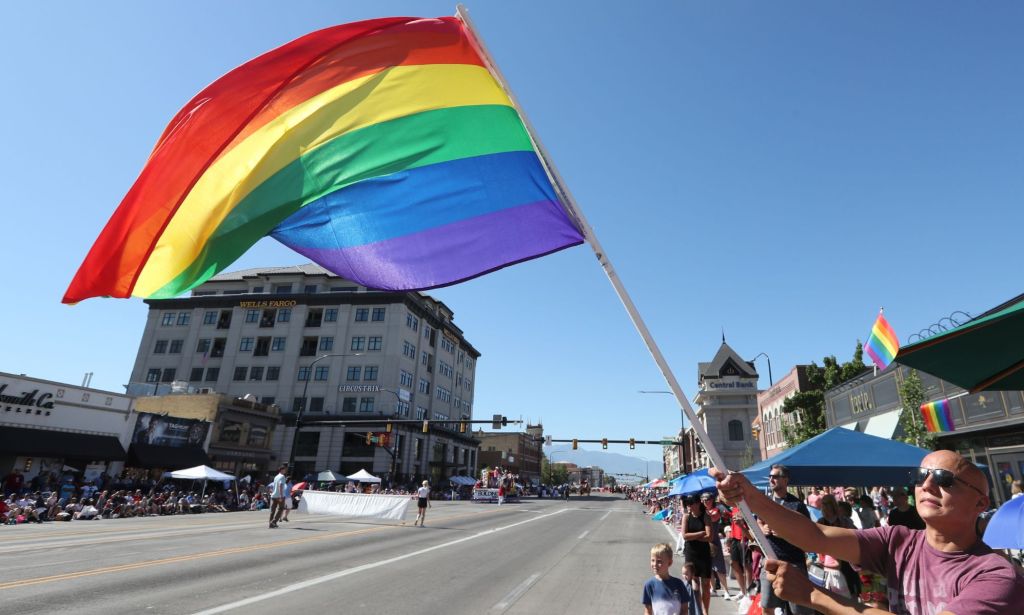Making trans Pride happen in ‘deeply religious, conservative’ Utah: ‘You’re not the only queer here’

Utah Trans Pride in 2019. (Supplied)
Conservative Utah is home to one of just a handful of trans Pride events in the US. Its organiser speaks to PinkNews about why it’s so vital, and why it’s important to celebrate queerness near to the notoriously anti-LGBTQ+ Brigham Young University.
Utah Trans Pride took place in the city of Provo, on Saturday (12 August), with trans, genderqueer, non-binary and other gender-diverse entertainers, trans+ vendors and booths where people can get information.
Provo is home to Brigham Young University (BYU), the private higher education institution operated by the Church of Latter Day Saints, also known as the Mormon Church. It is notorious for its anti-LGBTQ+ rules and attitudes, and, says Ian Giles, the surrounding city is, unsurprisingly, a “very religious, conservative” area.
Giles is the founder and executive director of Genderbands, a charity that supports and champions the trans community, including by organising Utah Trans Pride.
“I keep getting the question: ‘Why not do it in Salt Lake [City]?’,” they tell PinkNews.
“That’s where the Pride centre is, where they put on the big festival in Utah, where a lot of other resources are. Everything’s in Salt Lake. All the queers are in Salt Lake.
“And I’m like: ‘That’s kind of the point. You answered your own question because everything is in Salt Lake’.
“There is nothing here in Provo for our queer community, and I promise you not all the queers are in Salt Lake. They just have to be in the closet down here because we are right next to BYU.
“They are forced into the closet to be able to stay in school. So, I want to show the community you are not alone, you’re not the only queer – be it trans, gay, lesbian, bi and any of the other people in the rainbow – in Provo.
“And even if you can’t be out, you can still come to this festival, enjoy it, know that you’re safe and [that] you’re around your family and your community.”

As attacks on trans people continue to mount in the US, Giles says it’s more important than ever for people to show their strength as a community and mobilise in support – even though they know it’s “scarier to be visible”.
Giles adds: “Being trans is amazing. People outside the community act like it’s horrible, and they’d rather let their children die rather than see them transition. But when we transition is when we begin to live. We’re not alive until then.
“I think back to how I was pre-transition and how I am now. In some ways, I’m still the same person: my personality and my likes are the same. But in other ways, I’m different.
“I used to be that incredibly shy person who would stay in the corner, scribbling on their little notepad and wouldn’t talk to anybody. Now, here I am doing public speaking and interviews, putting on festivals and openly sharing my story with people.”
BYU, operated by the Mormon Church, has been under intense scrutiny for its anti-LGBTQ+ sentiment
LGBTQ+ rights have been a major issue at BYU for some time. The university plainly states that “any same-sex romantic behaviour” is a violation of its honour code.
“Violations of the honour code can result in disciplinary action, including expulsion from the school.”
In 2022, the US Department of Education dismissed a civil rights investigation into how LGBTQ+ students are disciplined at the university, saying the private religious establishment is exempt from federal laws prohibiting gender-based discrimination.
The institution has also banned protests near its large letter “Y” on a mountainside after protestors lit it up with rainbow colours.
BYU also doesn’t allow LGBTQ+ students to meet on campus in organised groups and Giles knows people who have been expelled for coming out as queer.
In September, a group of “angel” defenders protected LGBTQ+ students from protestors, including former and current BYU students, who shouted slurs at a Pride event.
Giles says it’s important for events such as Utah Trans Pride to exist because it’s about “taking our space” in an area that says there’s no room for queer people.
“We’re not taking up space, that has a negative connotation to it like we’re taking spaces that aren’t ours,” they say. “No, the straights may feel that way, but this is our community too.”
“We live here too. We are just taking the space that belongs to us rather than continuing to hide. We have always been here whether they want to acknowledge our existence or not.”

